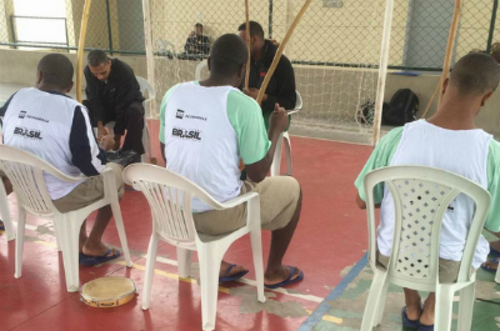By Adèle Charbonneau
Crime, inequality, and urban poverty are highly intertwined. Crime patterns can be both symptoms and drivers of inequality. Informal settlements often epitomize the hot spots of urban violence. But violence doesn't just make a neighborhood dangerous; it can actually perpetuate poverty for these already vulnerable places, as well. For example, crime prevents businesses from thriving by generating instability and uncertainty. Interrupting this vicious cycle is the challenge faced by many, particularly in Latin American and African cities. This article offers four examples of innovative initiatives to tackle violence in its various forms.
In the municipality of Sucre in Caracas, according to the national victimization survey, more than 80 percent of crimes are committed against low-income residents. Traditional methods of responding to or preventing crime, such as a fair and reliable criminal justice system and effective policing, involve the government. Communities, however, also have a critical role to play in the prevention of crime. Caracas Mi Convive is a local NGO that trains community organizers in the most violent areas of the city with leadership skills. Similarly, in Catuche, mothers of victims and opposed gangs organized themselves to force a peace treaty between their sons, stopping the shootings that were ravaging the community. These community-focused organizations can serve as liaisons to local authorities or as lobbying groups to demand government action. This liaison enables the difficult but essential creation of trust between community leaders and police departments, stopping a long history of abuse.
In Rio, many favela residents are children and adolescents who are vulnerable to organized crime and police brutality, among numerous other forms of violence. In Parada de Lucas, a district marked by violence, the Integrated Center for the Support of Children and Adolescents of the Community is a space for playing, discovering, learning, and being free. Volunteers monitor language, computer, and guitar classes, citizenship workshops, and visits to cultural centers for the youth. In parallel, the Institute Terra Nova supports adolescents already in conflict with the law. It helps them find a new life through artistic experiences, professional training, health care, and entrepreneurship activities. One of their partner institutions is the NGO Instituição do Homem Novo, which works to support minors after they have completed their state-ordered community service. Their philosophy says that young people are not potential agents of violence, but its victims, who need to be treated with respect, solidarity, and protection.
With a maximum occupancy rate of 26,757 for its 108 institutions, the Kenyan Prisons Service is currently operating at 202 percent of its capacity. A number of social ventures and advocacy groups are targeting transformative programming to counteract the intersectional issues of poverty, incarceration, and lack of representation. Founded in 2012, Support Me in My Shoes (SMiMS), is a social justice organization providing female inmates with critical items, such as soap and sanitary products, alongside literacy training and motivational support. From these efforts grew the social enterprise Clean Start, which provides female inmates and ex-inmates with training and employment opportunities in the services industry. For the youth, recidivism rates are intimately tied to tackling the poverty, lack of education, and unemployment. The Nafisika Trust works in collaboration with the Kenyan Prison Service to provide a spectrum of services with the aim of reducing recidivism rates and increasing opportunities to ex-convicts.
In Mexico, the violence that women suffer in private has crossed over from the domestic sphere into the heart of public policy. In an effort to change this, the Mexico City government's Ministry for Social Development created the Social Reintegration Program for Women Victims of Domestic Violence. It is an integral support system that assists women in achieving the basic conditions required for independence so that they are not financially dependent on their abusive partner, and can therefore live a life free from violence. The program operates alongside the Network of Domestic Violence Care and Prevention Units, a front-line network of 16 centers -- one in each of Mexico City's boroughs. Their aim is to provide women with legal counsel, psychological assistance, and information about domestic violence. Another complementary service is CAVI, a phone line offering assistance to women suffering from domestic abuse, provided by the Mexico City Attorney General.
Check out more of the discussion on fighting urban poverty by fighting inequality on URB.im and contribute your thoughts.
Photo credits: Instituto Terra Nova and Macnolete
Follow Josephine d'Allant on Twitter: www.twitter.com/urb_im

